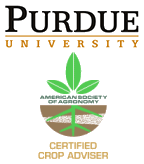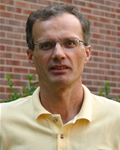
Proceedings 2006
Indiana Certified Crop Adviser Conference
Making the Best of Corn-Corn Monoculture
Eastern Corn Belt farmers are more likely to plant corn after corn than they were a decade ago when the corn-soybean rotation predominated. The expected growth in corn demand for ethanol will accelerate this trend. This presentation will highlight recent research results on many of the management factors that should be adjusted to best preserve yield potential, profits, and soil quality in this monoculture system. Since there are more challenges when corn follows corn instead of other crops in rotation, adoption of management adjustments to reduce the growing season stresses that corn plants face are even more important.
 Tony Vyn Professor, Cropping Systems Extension Agronomist
Tony Vyn Professor, Cropping Systems Extension Agronomist
Purdue University
tvyn@purdue.edu
Dr. Tony J. Vyn is a Professor and Cropping Systems Extension Agronomist in the Department of Agronomy at Purdue University. Tony grew up on a hog and cash crop farm near Chatham in Southwestern Ontario, Canada. He earned his degrees from the University of Guelph, (in Guelph, Ontario) and was a faculty member in the Crop Science Department at the same university from 1987 until he left for Purdue University in 1998. Dr. Vyn advises several graduate students in research focused on understanding the interactions of tillage, crop rotation, and nutrient placement systems with soil properties and crop response. His current investigations include tillage comparisons (like no-till versus strip tillage), RTK automatic guidance for strip tillage and nutrient banding, soil carbon sequestration, plant-to-plant variability in corn, greenhouse gas emissions, and deep banding versus broadcast placement of P and K fertilizers for corn and soybean in intended high yield environments. He has served as Extension Coordinator for the Agronomy Department at Purdue and as Associate Editor for the Crop Science Journal. In his spare time, he particularly enjoyed cash-crop farming with his own family from 1980 to 1998.